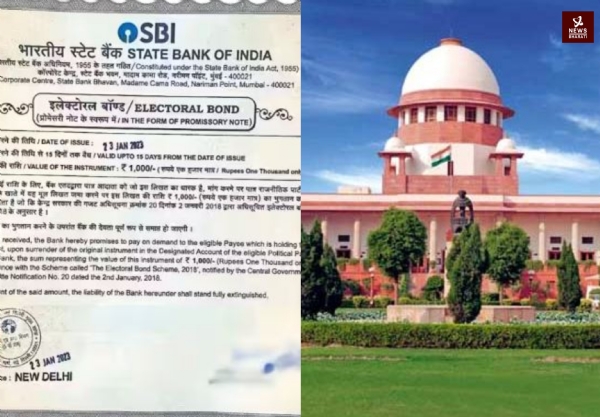NB Explains | Supreme Court invalidates Electoral Bonds Scheme terming it as 'unconstitutional'
The Court not only invalidated the electoral bonds scheme but also nullified amendments made to the Income Tax Act and the Representation of People Act that had enabled anonymous donations.
Total Views | 107
New Delhi, Feb 15: The Supreme Court on Thursday (Feb 15), delivered a significant judgment striking down the Electoral Bonds scheme, which allowed anonymous donations to political parties. The case, titled Association for Democratic Reforms and Anr vs Union of India Cabinet Secretary and ors, saw a unanimous decision by a five-judge Constitution bench comprising Chief Justice of India (CJI) DY Chandrachud and Justices Sanjiv Khanna, BR Gavai, JB Pardiwala, and Manoj Misra.

Details of the Hearing:
The Court not only invalidated the electoral bonds scheme but also nullified amendments made to the Income Tax Act and the Representation of People Act that had enabled anonymous donations. The unanimous decision deemed the scheme, due to its anonymous nature, as a violation of the right to information, thereby impinging on the freedom of speech and expression under Article 19(1)(a) of the Constitution. According to the judgment;
“Electoral Bonds Scheme, proviso to Section 29(1)(c) as amended by Section 139 of Income Tax Act and Section 13(b) as amended by Finance Act 2017 is violative of Article 19(1)(a)”
The Court directed the State Bank of India, the issuing bank of Electoral bonds, to disclose details of political parties that received such bonds, along with all relevant particulars, to the Election Commission of India (ECI) by March 6. The ECI is mandated to publish this information on its official website by March 13. Additionally, political parties are required to refund the amount of electoral bonds to the purchasers' accounts.
Noteworthy is the observation by the Court that the electoral bonds scheme could potentially advantage the party in power. The judgment noted, "Economic inequality leads to differing levels of political engagements. Access to info leads to influencing policy-making and also leading to quid pro quo arrangements may also help a party by the party in power."
The Court dismissed the argument that the scheme aimed to curb black money in politics. It emphasized that while donor privacy is important, transparency in political funding cannot be sacrificed by granting absolute exemptions. The verdict was the culmination of a case initiated on the legal validity of the electoral bonds scheme, with two concurring judgments authored by CJI DY Chandrachud and Justice Sanjiv Khanna. The Court had reserved its judgment on November 2, 2023, after a three-day hearing. During the case, the Supreme Court had requested data from the Election Commission of India (ECI) up to September 30, 2023, regarding electoral bonds sold under the scheme.
What is the Electoral Bonds Scheme?
The electoral bonds scheme, introduced through the Finance Act, 2017, allowed donors to contribute anonymously to political parties by purchasing bearer bonds from the State Bank of India. These bonds, issued for electoral funding purposes, came in various denominations. The Finance Act, passed as a money bill, amended the RBI Act, the Income Tax Act, and the Representation of People Act to facilitate the introduction of electoral bonds.
Also read: Ahead of CAA amendment, Mumbai ATS arrests 2 Rohingya Muslims; Know why are they national threat to India
Several petitions challenging the amendments made by the Finance Act, 2017, were filed before the Supreme Court. The petitioners argued that these changes paved the way for unlimited and unchecked funding of political parties. They also contested the categorization of the Finance Act as a money bill.
In response, the Central government asserted that the electoral bonds scheme maintained transparency. A previous application seeking a stay on the scheme had been dismissed by the apex court in March 2021.
--
Bharati Web






